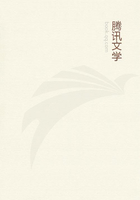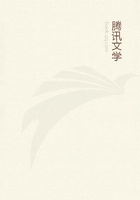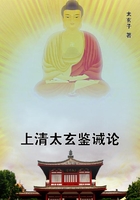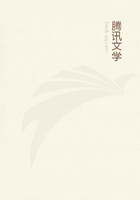At Florence, chief among artists I found Horatio Greenough, the American sculptor. His face was so handsome, and his person so well formed, that he might be pardoned, if, as was alleged, the face of his Medora, and the figure of a colossal Achilles in clay, were idealizations of his own. Greenough was a superior man, ardent and eloquent, and all his opinions had elevation and magnanimity. He believed that the Greeks had wrought in schools or fraternities, --the genius of the master imparting his design to his friends, and inflaming them with it, and when his strength was spent, a new hand, with equal heat, continued the work; and so by relays, until it was finished in every part with equal fire. This was necessary in so refractory a material as stone; and he thought art would never prosper until we left our shy jealous ways, and worked in society as they. All his thoughts breathed the same generosity. He was an accurate and a deep man. He was a votary of the Greeks, and impatient of Gothic art. His paper on Architecture, published in 1843, announced in advance the leading thoughts of Mr. Ruskin on the _morality_ in architecture, notwithstanding the antagonism in their views of the history of art. I have a private letter from him, --later, but respecting the same period, -- in which he roughly sketches his own theory. "Here is my theory of structure: Ascientific arrangement of spaces and forms to functions and to site;an emphasis of features proportioned to their _gradated_ importance in function; color and ornament to be decided and arranged and varied by strictly organic laws, having a distinct reason for each decision;the entire and immediate banishment of all make-shift and make-believe."Greenough brought me, through a common friend, an invitation from Mr. Landor, who lived at San Domenica di Fiesole. On the 15th May I dined with Mr. Landor. I found him noble and courteous, living in a cloud of pictures at his Villa Gherardesca, a fine house commanding a beautiful landscape. I had inferred from his books, or magnified from some anecdotes, an impression of Achillean wrath, --an untamable petulance. I do not know whether the imputation were just or not, but certainly on this May day his courtesy veiled that haughty mind, and he was the most patient and gentle of hosts. He praised the beautiful cyclamen which grows all about Florence; he admired Washington; talked of Wordsworth, Byron, Massinger, Beaumont and Fletcher. To be sure, he is decided in his opinions, likes to surprise, and is well content to impress, if possible, his English whim upon the immutable past. No great man ever had a great son, if Philip and Alexander be not an exception; and Philip he calls the greater man. In art, he loves the Greeks, and in sculpture, them only. He prefers the Venus to every thing else, and, after that, the head of Alexander, in the gallery here. He prefers John of Bologna to Michael Angelo; in painting, Raffaelle; and shares the growing taste for Perugino and the early masters. The Greek histories he thought the only good; and after them, Voltaire's. I could not make him praise Mackintosh, nor my more recent friends; Montaigne very cordially, -- and Charron also, which seemed undiscriminating. He thought Degerando indebted to "Lucas on Happiness" and "Lucas on Holiness"! He pestered me with Southey; but who is Southey?
He invited me to breakfast on Friday. On Friday I did not fail to go, and this time with Greenough. He entertained us at once with reciting half a dozen hexameter lines of Julius Caesar's! -- from Donatus, he said. He glorified Lord Chesterfield more than was necessary, and undervalued Burke, and undervalued Socrates;designated as three of the greatest of men, Washington, Phocion, and Timoleon; much as our pomologists, in their lists, select the three or the six best pears "for a small orchard;" and did not even omit to remark the similar termination of their names. "A great man," he said, "should make great sacrifices, and kill his hundred oxen, without knowing whether they would be consumed by gods and heroes, or whether the flies would eat them." I had visited Professor Amici, who had shown me his microscopes, magnifying (it was said) two thousand diameters; and I spoke of the uses to which they were applied.
Landor despised entomology, yet, in the same breath, said, "the sublime was in a grain of dust." I suppose I teased him about recent writers, but he professed never to have heard of Herschel, _not even by name._ One room was full of pictures, which he likes to show, especially one piece, standing before which, he said "he would give fifty guineas to the man that would swear it was a Domenichino." Iwas more curious to see his library, but Mr. H----, one of the guests, told me that Mr. Landor gives away his books, and has never more than a dozen at a time in his house.
Mr. Landor carries to its height the love of freak which the English delight to indulge, as if to signalize their commanding freedom. He has a wonderful brain, despotic, violent, and inexhaustible, meant for a soldier, by what chance converted to letters, in which there is not a style nor a tint not known to him, yet with an English appetite for action and heroes. The thing done avails, and not what is said about it. An original sentence, a step forward, is worth more than all the censures. Landor is strangely undervalued in England; usually ignored; and sometimes savagely attacked in the Reviews. The criticism may be right, or wrong, and is quickly forgotten; but year after year the scholar must still go back to Landor for a multitude of elegant sentences -- for wisdom, wit, and indignation that are unforgetable.
From London, on the 5th August, I went to Highgate, and wrote a note to Mr. Coleridge, requesting leave to pay my respects to him.

